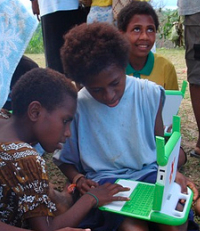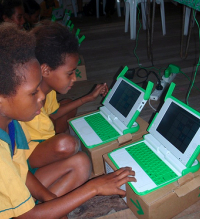The regional priorities for education in the Oceania region are embodied jointly in strategies such as the Forum Basic Education Plan, and nationally under the member states' own reform programmes that are supported by various donors.
One could say that some priorities are to improve and transform teacher education, curricula, and vocational education, with many voices (c.f. the PRIDE Project) calling for more Pacific cultural relevance and culturally appropriate pedagogy and content introduced into all of these areas, as well as a shift towards more progressive methods such as "active learning" and "learning by doing". There are a lot of challenges with these areas.
As we see it, increasingly reflected in our ongoing trials, the OLPC is an "agent of change" for these desired reforms. However, it is more than that. Because it is not merely focused on academic education, but education in a much wider sense, with capability for bringing educational resources to the wider community in respect to technical and vocational education, distance learning and life skills.
Because it brings in a coordinated intervention also comprising communications and electrification, it is also a community access project, bridging the digital divide and with potential economic development impacts across the sectors. Thus, one might best summarise the OLPC as a "human development" programme.
The Pedagogic Impacts Of OLPC
The aims of an OLPC programme are to improve quality and achieve universal access to basic education. The technology is designed especially for children in remote and impoverished areas. OLPC is a transformational technology, because it has the potential to affect widespread change in education. It is also a "catalyst" for wider economic development.
This is in line with the sub-text to the Pacific Plan Digital Strategy of the Pacific Islands Forum, which reads "Reaching Out to Remote and Rural Communities". However, there are also many impoverished urban populations in Paupa New Guinea (PNG) and these can equally benefit.
To understand the potential impacts of an OLPC programme, one can start with more generally understood impacts of ICT in education, and then focus on the particular characteristics of OLPC, with its core principles, specialised technology and foundations in constructivist learning.
We can then study the processes by which an OLPC project can affect change in terms of a traditional school effectiveness model, and the challenges that are presented to countries wishing to implement OLPC programmes. Finally, we must understand the priorities for education reform in the region, in the context of globalisation and the need to steer the reform towards more culturally relevant approaches in education.
A detailed list and diagram is attached in the annex, with a list of attributes, illustrates how the results of an OLPC program must take into account all of these priorities and challenges, together with a reflective management approach informed by an effective, continuing evaluation process.
The Challenges
In summary, the main challenges are given below, with illustrations of approaches that have been tried with some success during the pilot phase:
- Governance. Building a sustainable coordinating body that ensures government ownership and adherence to education policy and standards, but leverages partnerships with suitable "champion" organisations, usually NGOs including academic institutions, to provide and build the national capacity to run trials, develop a national strategy and then scale up OLPC roll out.
- Teacher Training. We need to train teachers how to integrate the laptops into their teaching and facilitate the children's learning. One strategy is to seed capacity in the teacher education institutions of a country, as in PNG with Divine Word University and Don Bosco Technology Institute.
They are introducing OLPC components into their curricula so that their graduates will have a certified level of familiarity with the OLPC principles and technicalities, which will eventually be accredited in some way by the Department. The teachers of the trials projects are pioneering teaching ideas with the laptops, following initial training.
A supportive relationship can be built up with the teaching schools, who can develop new methods of curriculum integrations and so on, and reflect on the experience of the teachers. Included in this challenge is making sure that these activities are linked back to the education system via the school inspectors and local education officers, so that there is adherence to standards and accountability. - Power infrastructure. This is a technical area, but although the laptops use only 5W each, a large school in a rural area with no grid power presents a challenge to enable recharging each day. SPC is looking at many solutions. OLPC Boston have some very reduced price, appropriate designs for solar power supplies (such as flexible solar panel "blankets" costed at USD 2.50 per W, and multiple channel battery chargers).
But over 100 XO laptops or so and solar power supplies becomes large and vulnerable, so SPC are also investigating innovations such as diesel generators from India and China that run on coconut oil. The three schools in Solomons are candidates for one such system. There are underused copra plantations and teachers say that parents could send more children to school, paying fees with coconuts. Unused oil is bought buy the local company supplying and supporting the generators.
A site by site approach is required - as there are often local "work arounds" and partnerships that can help. - Content and curriculum integration.The OLPC allows curriculum departments to look at new ways of creating and pooling education resources with their neighbours in the Pacific. Related to this, is Commonwealth of Learning's "L4C" Wikieducator training programme in the region, including new ways of collaboration to create an access open education resources. The voices from PRIDE also call out for this.
The laptop has the potential to really empower teachers to create their own content, which can be shared more widely, and in direct input to curriculum development. We can also help find sources of local content from other providers, from development programs dealing with conservation, HIV/AIDS, conservation, fishery management, to lifestyle and promotion of the Pacific identity and cultures.
For instance the SIL group have "bible translators" all over the region, embedded in communities working closely with primary school teachers. In PNG they have made available several examples of local language "PDF Readers" - electronic books aimed at 6-year olds upwards, on relevant topics and very culturally sensitive.
Authors / contacts
The post above is an excerpt from Some Feedback on Challenges and Impacts of OLPC. For more information about OLPC Oceania and its activities, please contact:




The program that you outline is impressively comprehensive. It would be helpful, in many ways, if you could point to what you term the " more generally understood impacts of ICT in education." It would be particularly helpful to know what the basis of the general understanding is (e.g., large-scale experimental results, small-scale experiments, one-off qualitative reports, etc.).
In another vein, it's great to see acknowledgement of the potential for community development through infrastructure upgrades (electrical power, chiefly) as well as through community access to information.
I am practicing lawyer in Bangladesh. I attended OLPC program at MIT in 2008. It would be very helpful for a developing country like Bangladesh if you organize this kind of human development program. This kind of program will enable our poor children to know about a laptop. I would humbly request to your esteemed organization to arrange such Human developing program in Bangladesh.